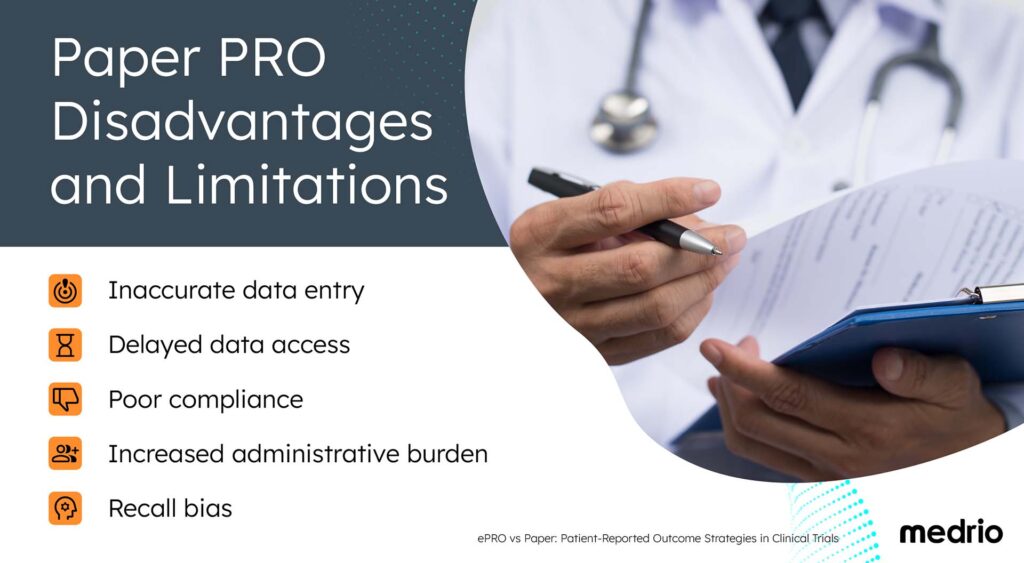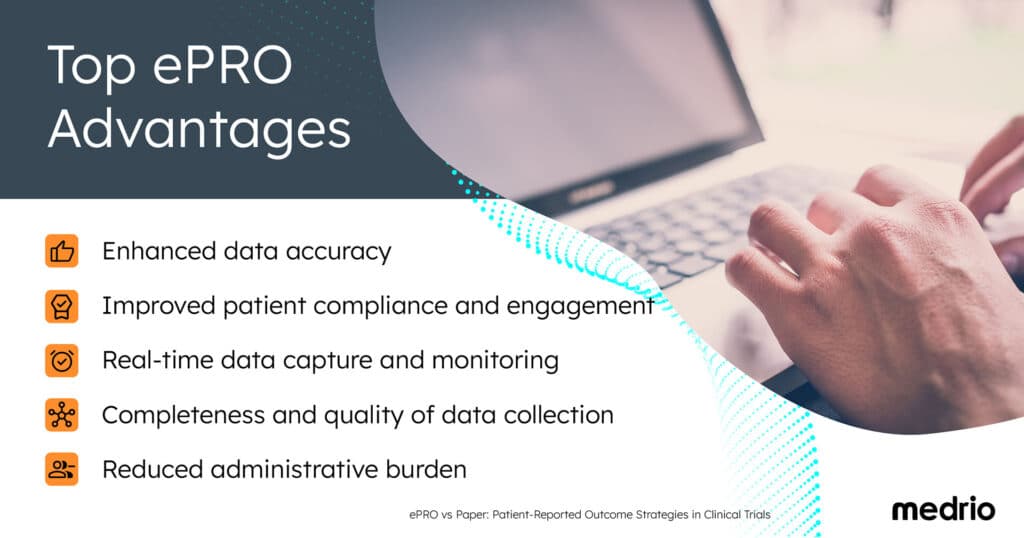Contributing expert at Medrio: Melissa Newara, VP of eClinical Solutions and Consulting
What is the difference between electronic patient-reported outcomes (ePRO) vs paper PRO in clinical trials? The importance of accurate and timely clinical trial data is driving conversation.
Researchers need compliant, efficient, and accurate data collection. Clinical trials also benefit from high patient engagement. ePRO software may be the answer to these needs.
Several key factors are driving the transition from paper to digital:
- Improved data quality: Less risk of errors and missing data via automated checks and real-time monitoring.
- Enhanced patient compliance: Easier and more convenient for patients, leading to higher adherence.
- Real-time data access: Immediate data access for stakeholders enables quicker decision-making.
- Cost efficiency: Less staff burden and lower long-term costs for electronic processes.
- Encouragement from regulatory bodies: Increased acceptance and encouragement from regulatory bodies for digital data collection.
Learn more by exploring this blog with tips on ePROM implementations from the eCOA Consortium.
The Disadvantages of Paper Diaries, Surveys and Assessments
Paper diaries, surveys and assessments were once a staple in clinical trials. Now, they present disadvantages that impact data collection and analysis.
Limitations of paper PRO include:
- Inaccurate data entry: Patients may forget to complete entries and backfill data, leading to unreliable data.
- Delayed data access: Researchers face delays in accessing and analyzing data because of manual entry and collection.
- Poor compliance: Inconvenient paper diaries often result in lower participant adherence rates.
- Increased administrative burden: Managing, storing, and transcribing paper diaries requires many resources.
- Recall bias: Patients may delay completion, falsify dates, or pre-fill information.

Data Inaccuracy
Paper surveys and diaries are prone to errors and inaccuracies. Illegible handwriting, missing data, and retrospective participant entries are common.
People make mistakes that can affect accuracy. These mistakes include unclear marks, incomplete forms, missing information, hard-to-read writing, out-of-range responses, and added choices. With more complicated assessments, participants may make errors related to branching and skip patterns making their responses illogical and unable to be used.
Paper surveys and diaries aren’t easily time-regulated. A lack of timely entries causes errors because of recall bias, misremembering, or forgetting information.
Read our blog to learn more about how quality data is transforming clinical research.
Delayed Data Access
Delayed data access is a drawback of paper assessments. Paper-based methods involve many manual steps.
Study staff must physically distribute, collect, and transcribe paper PROs. This process can lead to large time lags before clinical data analysis. Additionally, there is a risk of lost or misplaced assessments.
Plus, tracking paper survey completion is challenging. If patients don’t complete entries on time, the data may not be compliant.
These inefficiencies hinder timely monitoring and decision-making, compromising patient safety and trial progress. Without real-time reporting, there may be delays in clinical decision making related to the patient entered data.
Compliance Challenges
Paper PROs cannot automatically timestamp data or ensure timely entry. This lack of functionality means more compliance challenges. Participants may forget to fill out paper diaries and pre-fill entry dates. These errors impact data integrity and trial outcomes.
Another common issue with paper-based surveys is “parking lot syndrome.” This issue occurs when participants fill out all their surveys in the parking lot immediately before a site visit.
Compliance with paper survey completion may be as low as 8 to 14 percent and is usually no higher than 30%. Studies show 90 to 97 percent compliance with electronic surveys. Some patients note that electronic diaries are easier to use.
Increased Workload
Manual data collection and entry take time. Activities that often involve deciphering handwriting and addressing missing data. Manual data entry and cleaning processes are time-consuming and labor-intensive.
Staff must prepare, distribute, and collect patient packets. Then staff transcribe diary entries into the Electronic Data Capture (EDC) system.
Additional entry complexities may be required based on the assessments used, for example staff may be required to measure patients’ visual analog scales (VAS) by hand. They may also have to manually complete source data verification (SDV).
Recall Bias
Paper versions of PROs are less timely than electronic versions. Participants may struggle to recall symptoms and experiences. Recall challenges lead to biased or incomplete data.
With paper surveys, patients may delay completion, falsify dates, or pre-fill information.
For example, a British Medical Journal study found patients in a chronic pain study recorded only 11% of entries on time but claimed 90% accuracy. Such backfilling introduces recall bias, compromising data quality and accuracy.
The Advantages of ePRO over Paper PRO
ePRO systems offer significant advantages over traditional paper diaries. With electronic collection, researchers can enhance clinical trials.
The benefits of ePRO include:
- Enhanced data accuracy: Automated checks and real-time monitoring reduce errors and missing data. This functionality ensures more precise and reliable information.
- Improved patient compliance and engagement: Digital tools are more convenient for patients. Convenience leads to higher adherence rates and more consistent data entry.
- Real-time data capturing and monitoring: Researchers can access data immediately. Easy access enables quicker decision-making and more responsive trial management.
- Cost-effectiveness: Less manual processes and data reconciliation efforts translate into lower costs.
- Remove recall bias: ePRO solutions prevent data inaccuracies from delayed or falsified entries.
- Better regulatory compliance: ePRO clinical trial software reduces errors and missing data. They provide accurate, consistent, and traceable clinical data collection.
- Completeness and quality of data collection: Electronic data capture in clinical trials enables complete, accurate collection in real time.
- Reduced administrative burden: Automation and digital processes cut the time and resources needed.
- Improved patient safety: Immediate access to ePRO data in clinical trials helps researchers quickly identify and address issues.
- Eco-friendly data collection: ePRO software minimizes paper usage and waste.

Increased Data Accuracy and Reliability
ePRO solutions reduce human error and recall bias. Fewer errors mean more accurate information about the patient experience.
Surveys via ePRO are less error-prone than paper surveys. ePRO prevents missing data, hard-to-read writing, and unclear stray marks. It also eliminates illogical responses, such as marks outside a visual analog scale (VAS) or hand-written responses in the margins.
In our data quality and compliance success story, learn how one biotech created efficiency to drive large-scale trials.
Enhanced Participant Compliance and Engagement
Utilizing electronic devices support higher compliance rates and a better user experience for patients. Digital data capture supports patient-centric trials.
Notifications, alerts, and other interactive elements aid participant engagement. For example, participants receive notifications to complete surveys according to the protocol schedule.
Many patients already carry electronic devices at work and at home. Allowing patients to use these devices means they have easy access to surveys. Additionally, electronic reminders via email and text encourage engagement.
Real-time data capture and monitoring
With ePRO, stakeholders have immediate access to patient-reported data. Real-time access to data enables informed decisions with zero delays.
Researchers can monitor patient responses as they occur, allowing prompt identification of issues and clinical trial data trends. Monitoring in real time ensures data is accurate and up-to-date. Additionally, it streamlines data management and reduces lag times in data processing.
Cost-effectiveness
ePRO solutions reduce the administrative and logistical burdens associated with traditional paper diaries. While the initial cost of paper diaries may seem low, the work created after can trigger huge costs. ePRO can reduce costs by decreasing data reconciliation efforts and manual processes.
ePRO minimizes the need for data entry automation, manual transcription, and data cleaning. These efficiencies lead to big labor and time savings.
Additionally, ePRO improves data accuracy and compliance. With less costly errors and protocol deviations, there is more financial sustainability.
Eliminate recall bias
An electronic approach to PROs reduces recall bias in clinical research by enabling immediate data entry by patients. Unlike traditional paper diaries, ePRO prompts timely data entries. This approach ensures that patient-reported outcomes more accurately reflect experiences.
The required immediacy of ePRO entries improves the accuracy and reliability of the data collected. Participants are less likely to forget details or misremembered events. Plus, timestamps ensure entry dates are accurate.
Better regulatory compliance
ePRO technology enhances regulatory compliance by providing standardized, validated methods for collecting patient-reported outcomes. It also helps meet patient-centric standards.
For example, the FDA’s patient-focused drug development (PFDD) program. This program “is a systematic approach to help ensure that patients’ experiences, perspectives, needs, and priorities are captured and meaningfully incorporated into drug development and evaluation.”
Digital tools should ensure that clinical trial data collection is convenient for participants and compliant. This software allows researchers to meet regulations for integrity and traceability.
Consistent, accurate data collection in clinical trials ensures data is readily accessible for review. Automated timestamps and audit trails make it easy to prove adherence to guidelines. ePRO also reduces the risk of errors and missing data, which are critical regulation requirements.
Read more about what regulations Medrio adheres to and recommends for data security.
Completeness and quality of data collection
ePRO enables thorough data collection in real-time, ensuring completeness, quality, timeliness, and accuracy.
Participants commonly underreport symptoms, especially mild ones. Underreporting is often due to forgetfulness, misunderstandings, or concerns about treatment.
ePRO allows real-time symptom reporting. It also sends clear instructions via notifications to ensure completion of all fields. Researchers receive alerts for out-of-range responses, supporting quick action.
Explore Medrio’s solutions that empower high-quality data collection.
Reduced administrative burden
ePRO streamlines data management. Automating reconciliation processes reduces manual entry and cleaning efforts.
With paper surveys, research staff must manually enter data into an electronic database. Data cleaning and reconciliation can be lengthy and costly, depending on the number of participants and surveys.
ePRO software eliminates these steps by automatically reconciling data and speeding up clinical trial data analysis.
Improved patient safety
Patient safety may benefit from the timely reporting associated with ePRO. Immediate data access allows researchers to quickly identify and address issues. This approach enables intervention if needed, to mitigate potential risks.
Clinical trial participants may wait for their appointments to report issues. Yet, ePRO can capture this data as it occurs. ePRO consistently tracks symptoms and side effects to ensure prompt reporting of any issues. This prompt reporting fosters a safer clinical trial environment.
Discover other ways health information technology is transforming human lives.
Eco-friendly data collection
ePRO solutions promote eco-friendly data collection in clinical research. Research staff don’t need to print or store paper forms. Without paper usage and waste, there is less environmental impact from manufacturing, transporting, and disposing of paper products.
Digital data collection also lowers the carbon footprint linked to physical documents. Electronic methods support sustainability efforts. They make the data collection process more efficient and environmentally responsible.
Overcome Early Phase Challenges with ePRO
Regulators and payers are emphasizing the inclusion of patient-reported outcomes in study designs. Researchers need to focus on efficiently generating such high-quality data from the start. This early attention is critical to ensure accurate, reproducible, and valuable findings.
In early phase trials, patient safety is especially important. With ePRO, researchers can catch issues quickly. They can also facilitate accurate, automated AE reporting.
A flexible ePRO software is particularly supportive for early phase trials. It allows research teams to pivot based on protocol needs while offering various options to participants.
ePRO enhances data integrity and compliance with regulatory guidelines. It also ensures patient feedback is accurate when captured and reported. With standardized, validated collection methods, ePRO addresses payer requirements for patient-reported outcomes.
Additionally, ePRO software can reduce staff workload through automated reporting and notifications.
Read this article on ePROM implementation to learn more best practices.
How Medrio’s ePRO Software Improves Data Collection
Medrio eCOA/ePRO empowers participants, clinicians, and observers.
With Medrio you can:
- Improve participant engagement: A web-based, device-agnostic solution that makes participation convenient.
- Support complex protocols: Collect data in-clinic or remotely with validated and home-grown surveys.
- View clinical data in real time: Access data for quick decisions with no delays between collection and monitoring.
Medrio eCOA/ePRO also integrates directly with Medrio CDMS/EDC. Integrating ePRO with an EDC early in a study’s setup creates seamless processes and improved data security. This seamless integration enables comprehensive, real-time data analysis and stronger clinical evidence.
See Medrio eCOA/ePRO in action by requesting a demo. Or learn how your peers have seen success in this Medrio eCOA/ePRO case study.
Ready to Gain the ePRO Advantage?
ePRO offers many benefits over traditional paper diaries. With ePRO, research teams improve data accuracy, patient engagement, data access, staff workload, and regulatory compliance.
At Medrio, we make participation easy with our web-based, device-agnostic solution. Our digital tools can improve data quality and collection, helping you prove value to regulators and payors.
We encourage you to explore how ePRO can enhance your trials. A more efficient and reliable way for clinical study data capture of patient-reported outcomes.
Transform your data collection process today. Learn more about using Medrio eCOA/ePRO.



